PUBH6001: Health Advocacy Report on Mental Health and Obesity
VerifiedAdded on 2022/10/10
|6
|1530
|328
Report
AI Summary
This report, addressing the PUBH6001 assignment, focuses on health advocacy concerning mental health and obesity within the context of South Australia. It begins by outlining the prevalence of mental health illnesses in South Australia and Australia, emphasizing the impact on individuals and families, and the role of the South Australian Mental Health and Wellbeing Policy. The report then explores the overlooked areas of consumer and career participation in the mental health care process. Subsequently, it discusses obesity as a critical issue linked to mental health, citing statistics from the National Health Survey. The importance of the issue is analyzed, highlighting the relationship between obesity, physical mobility, and mental health disorders, along with biological and psychological factors. The report concludes by suggesting advocacy strategies to enhance awareness among individuals with mental health disorders, aiming to mitigate the adverse effects of poor mental health conditions. The references include key government publications and research papers supporting the analysis.

Running head: HEALTH ADVOCACY
Health Advocacy
Name of the Student
Name of the University
Author Note
Health Advocacy
Name of the Student
Name of the University
Author Note
Paraphrase This Document
Need a fresh take? Get an instant paraphrase of this document with our AI Paraphraser
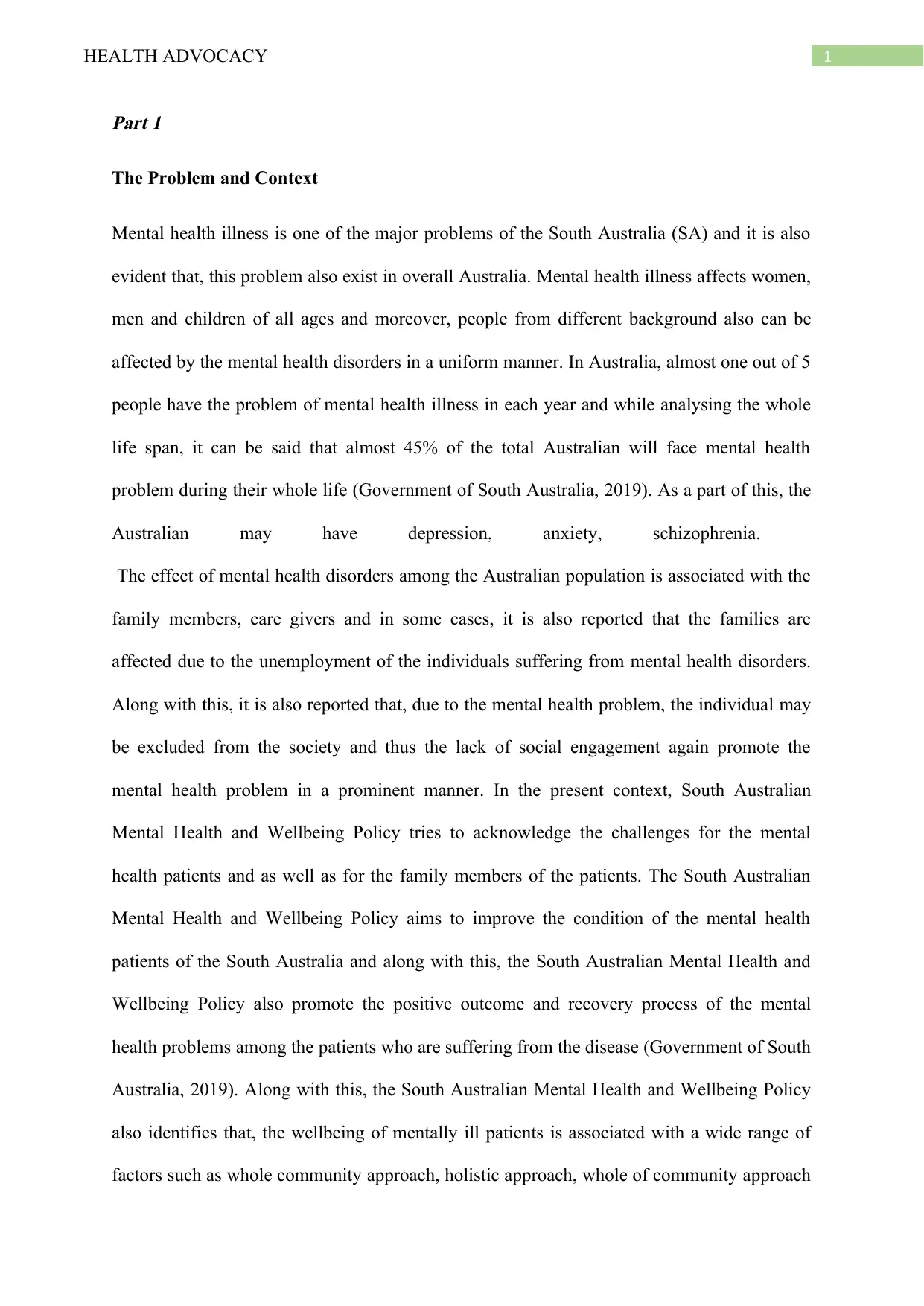
1HEALTH ADVOCACY
Part 1
The Problem and Context
Mental health illness is one of the major problems of the South Australia (SA) and it is also
evident that, this problem also exist in overall Australia. Mental health illness affects women,
men and children of all ages and moreover, people from different background also can be
affected by the mental health disorders in a uniform manner. In Australia, almost one out of 5
people have the problem of mental health illness in each year and while analysing the whole
life span, it can be said that almost 45% of the total Australian will face mental health
problem during their whole life (Government of South Australia, 2019). As a part of this, the
Australian may have depression, anxiety, schizophrenia.
The effect of mental health disorders among the Australian population is associated with the
family members, care givers and in some cases, it is also reported that the families are
affected due to the unemployment of the individuals suffering from mental health disorders.
Along with this, it is also reported that, due to the mental health problem, the individual may
be excluded from the society and thus the lack of social engagement again promote the
mental health problem in a prominent manner. In the present context, South Australian
Mental Health and Wellbeing Policy tries to acknowledge the challenges for the mental
health patients and as well as for the family members of the patients. The South Australian
Mental Health and Wellbeing Policy aims to improve the condition of the mental health
patients of the South Australia and along with this, the South Australian Mental Health and
Wellbeing Policy also promote the positive outcome and recovery process of the mental
health problems among the patients who are suffering from the disease (Government of South
Australia, 2019). Along with this, the South Australian Mental Health and Wellbeing Policy
also identifies that, the wellbeing of mentally ill patients is associated with a wide range of
factors such as whole community approach, holistic approach, whole of community approach
Part 1
The Problem and Context
Mental health illness is one of the major problems of the South Australia (SA) and it is also
evident that, this problem also exist in overall Australia. Mental health illness affects women,
men and children of all ages and moreover, people from different background also can be
affected by the mental health disorders in a uniform manner. In Australia, almost one out of 5
people have the problem of mental health illness in each year and while analysing the whole
life span, it can be said that almost 45% of the total Australian will face mental health
problem during their whole life (Government of South Australia, 2019). As a part of this, the
Australian may have depression, anxiety, schizophrenia.
The effect of mental health disorders among the Australian population is associated with the
family members, care givers and in some cases, it is also reported that the families are
affected due to the unemployment of the individuals suffering from mental health disorders.
Along with this, it is also reported that, due to the mental health problem, the individual may
be excluded from the society and thus the lack of social engagement again promote the
mental health problem in a prominent manner. In the present context, South Australian
Mental Health and Wellbeing Policy tries to acknowledge the challenges for the mental
health patients and as well as for the family members of the patients. The South Australian
Mental Health and Wellbeing Policy aims to improve the condition of the mental health
patients of the South Australia and along with this, the South Australian Mental Health and
Wellbeing Policy also promote the positive outcome and recovery process of the mental
health problems among the patients who are suffering from the disease (Government of South
Australia, 2019). Along with this, the South Australian Mental Health and Wellbeing Policy
also identifies that, the wellbeing of mentally ill patients is associated with a wide range of
factors such as whole community approach, holistic approach, whole of community approach
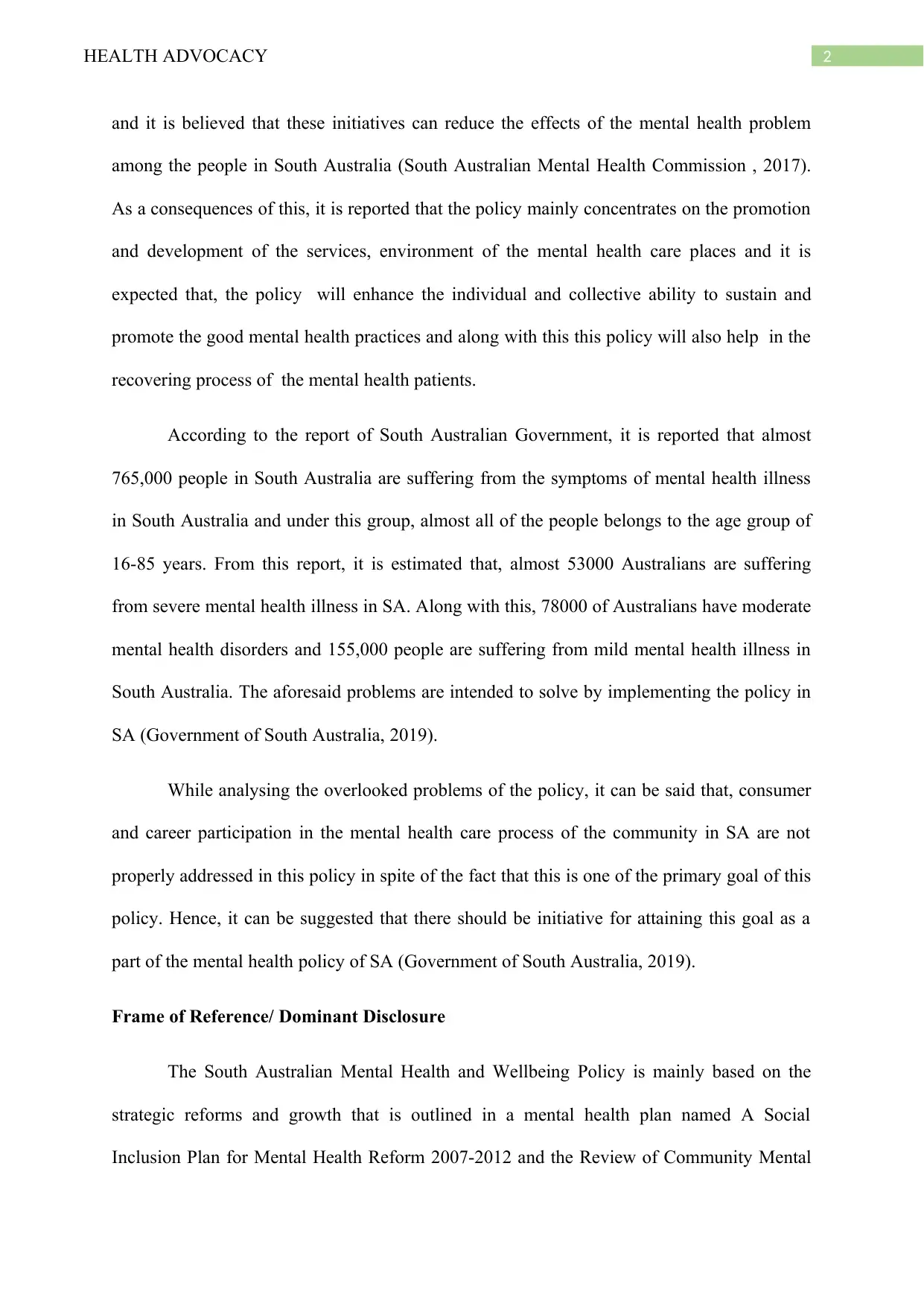
2HEALTH ADVOCACY
and it is believed that these initiatives can reduce the effects of the mental health problem
among the people in South Australia (South Australian Mental Health Commission , 2017).
As a consequences of this, it is reported that the policy mainly concentrates on the promotion
and development of the services, environment of the mental health care places and it is
expected that, the policy will enhance the individual and collective ability to sustain and
promote the good mental health practices and along with this this policy will also help in the
recovering process of the mental health patients.
According to the report of South Australian Government, it is reported that almost
765,000 people in South Australia are suffering from the symptoms of mental health illness
in South Australia and under this group, almost all of the people belongs to the age group of
16-85 years. From this report, it is estimated that, almost 53000 Australians are suffering
from severe mental health illness in SA. Along with this, 78000 of Australians have moderate
mental health disorders and 155,000 people are suffering from mild mental health illness in
South Australia. The aforesaid problems are intended to solve by implementing the policy in
SA (Government of South Australia, 2019).
While analysing the overlooked problems of the policy, it can be said that, consumer
and career participation in the mental health care process of the community in SA are not
properly addressed in this policy in spite of the fact that this is one of the primary goal of this
policy. Hence, it can be suggested that there should be initiative for attaining this goal as a
part of the mental health policy of SA (Government of South Australia, 2019).
Frame of Reference/ Dominant Disclosure
The South Australian Mental Health and Wellbeing Policy is mainly based on the
strategic reforms and growth that is outlined in a mental health plan named A Social
Inclusion Plan for Mental Health Reform 2007-2012 and the Review of Community Mental
and it is believed that these initiatives can reduce the effects of the mental health problem
among the people in South Australia (South Australian Mental Health Commission , 2017).
As a consequences of this, it is reported that the policy mainly concentrates on the promotion
and development of the services, environment of the mental health care places and it is
expected that, the policy will enhance the individual and collective ability to sustain and
promote the good mental health practices and along with this this policy will also help in the
recovering process of the mental health patients.
According to the report of South Australian Government, it is reported that almost
765,000 people in South Australia are suffering from the symptoms of mental health illness
in South Australia and under this group, almost all of the people belongs to the age group of
16-85 years. From this report, it is estimated that, almost 53000 Australians are suffering
from severe mental health illness in SA. Along with this, 78000 of Australians have moderate
mental health disorders and 155,000 people are suffering from mild mental health illness in
South Australia. The aforesaid problems are intended to solve by implementing the policy in
SA (Government of South Australia, 2019).
While analysing the overlooked problems of the policy, it can be said that, consumer
and career participation in the mental health care process of the community in SA are not
properly addressed in this policy in spite of the fact that this is one of the primary goal of this
policy. Hence, it can be suggested that there should be initiative for attaining this goal as a
part of the mental health policy of SA (Government of South Australia, 2019).
Frame of Reference/ Dominant Disclosure
The South Australian Mental Health and Wellbeing Policy is mainly based on the
strategic reforms and growth that is outlined in a mental health plan named A Social
Inclusion Plan for Mental Health Reform 2007-2012 and the Review of Community Mental
⊘ This is a preview!⊘
Do you want full access?
Subscribe today to unlock all pages.

Trusted by 1+ million students worldwide
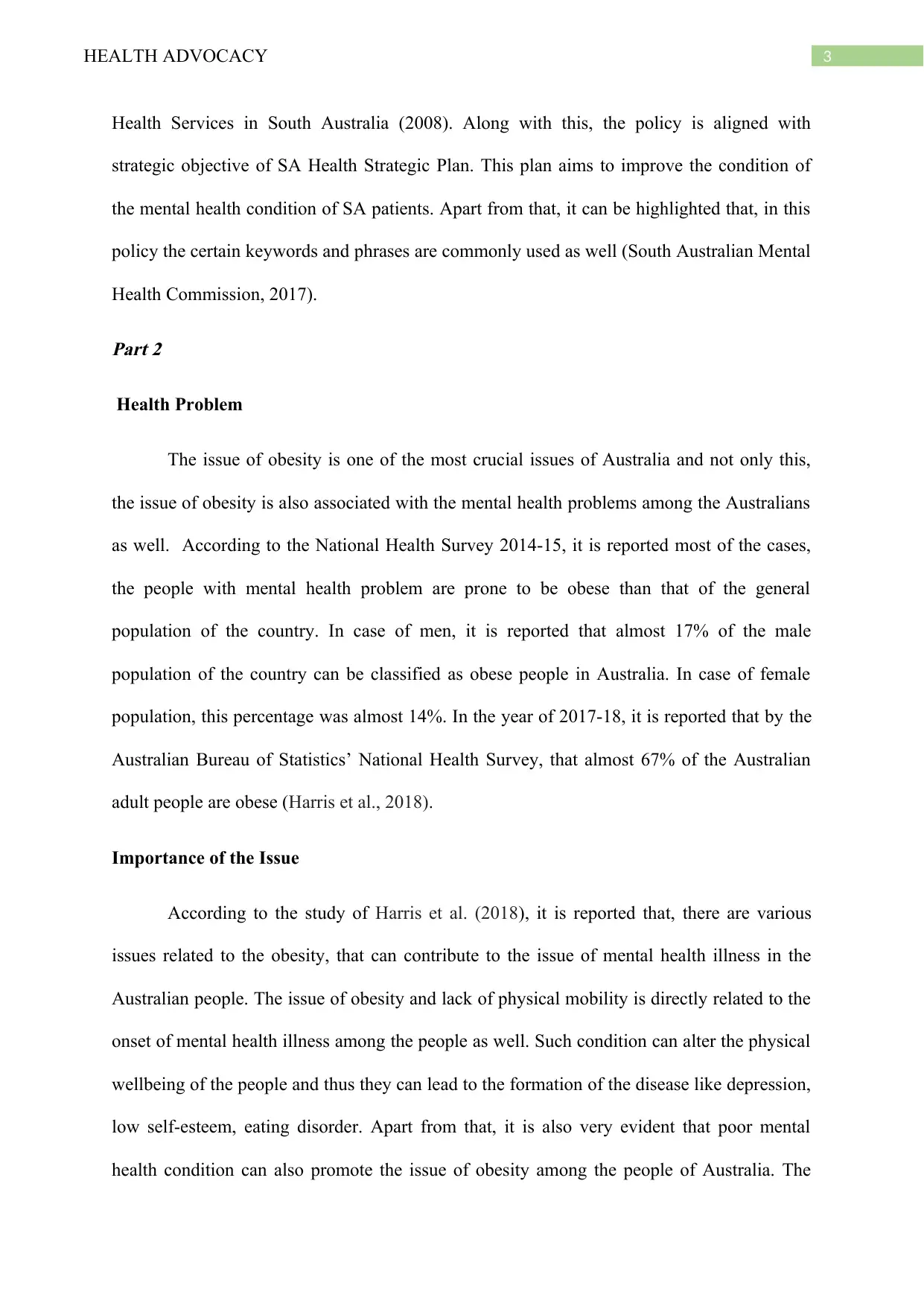
3HEALTH ADVOCACY
Health Services in South Australia (2008). Along with this, the policy is aligned with
strategic objective of SA Health Strategic Plan. This plan aims to improve the condition of
the mental health condition of SA patients. Apart from that, it can be highlighted that, in this
policy the certain keywords and phrases are commonly used as well (South Australian Mental
Health Commission, 2017).
Part 2
Health Problem
The issue of obesity is one of the most crucial issues of Australia and not only this,
the issue of obesity is also associated with the mental health problems among the Australians
as well. According to the National Health Survey 2014-15, it is reported most of the cases,
the people with mental health problem are prone to be obese than that of the general
population of the country. In case of men, it is reported that almost 17% of the male
population of the country can be classified as obese people in Australia. In case of female
population, this percentage was almost 14%. In the year of 2017-18, it is reported that by the
Australian Bureau of Statistics’ National Health Survey, that almost 67% of the Australian
adult people are obese (Harris et al., 2018).
Importance of the Issue
According to the study of Harris et al. (2018), it is reported that, there are various
issues related to the obesity, that can contribute to the issue of mental health illness in the
Australian people. The issue of obesity and lack of physical mobility is directly related to the
onset of mental health illness among the people as well. Such condition can alter the physical
wellbeing of the people and thus they can lead to the formation of the disease like depression,
low self-esteem, eating disorder. Apart from that, it is also very evident that poor mental
health condition can also promote the issue of obesity among the people of Australia. The
Health Services in South Australia (2008). Along with this, the policy is aligned with
strategic objective of SA Health Strategic Plan. This plan aims to improve the condition of
the mental health condition of SA patients. Apart from that, it can be highlighted that, in this
policy the certain keywords and phrases are commonly used as well (South Australian Mental
Health Commission, 2017).
Part 2
Health Problem
The issue of obesity is one of the most crucial issues of Australia and not only this,
the issue of obesity is also associated with the mental health problems among the Australians
as well. According to the National Health Survey 2014-15, it is reported most of the cases,
the people with mental health problem are prone to be obese than that of the general
population of the country. In case of men, it is reported that almost 17% of the male
population of the country can be classified as obese people in Australia. In case of female
population, this percentage was almost 14%. In the year of 2017-18, it is reported that by the
Australian Bureau of Statistics’ National Health Survey, that almost 67% of the Australian
adult people are obese (Harris et al., 2018).
Importance of the Issue
According to the study of Harris et al. (2018), it is reported that, there are various
issues related to the obesity, that can contribute to the issue of mental health illness in the
Australian people. The issue of obesity and lack of physical mobility is directly related to the
onset of mental health illness among the people as well. Such condition can alter the physical
wellbeing of the people and thus they can lead to the formation of the disease like depression,
low self-esteem, eating disorder. Apart from that, it is also very evident that poor mental
health condition can also promote the issue of obesity among the people of Australia. The
Paraphrase This Document
Need a fresh take? Get an instant paraphrase of this document with our AI Paraphraser
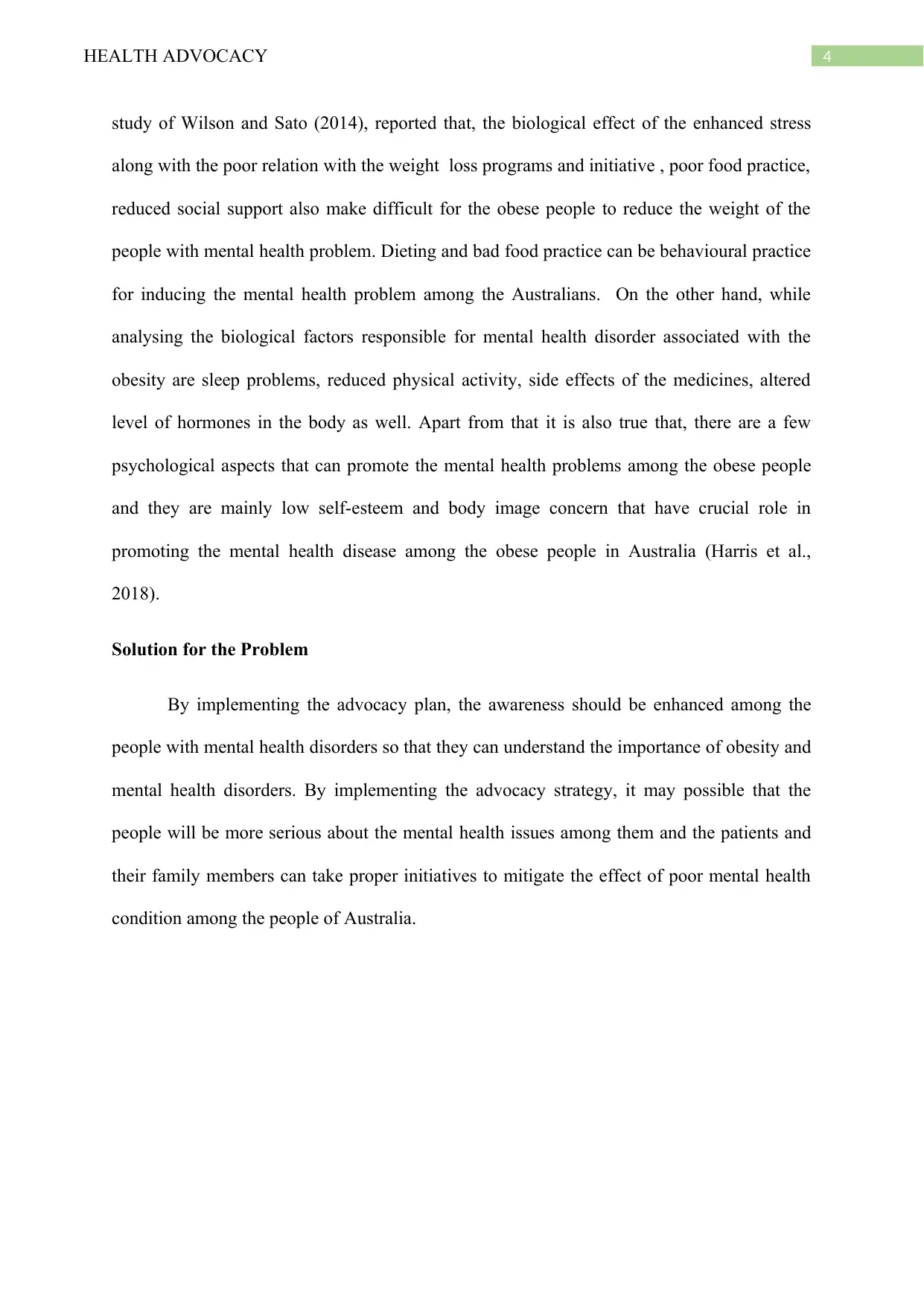
4HEALTH ADVOCACY
study of Wilson and Sato (2014), reported that, the biological effect of the enhanced stress
along with the poor relation with the weight loss programs and initiative , poor food practice,
reduced social support also make difficult for the obese people to reduce the weight of the
people with mental health problem. Dieting and bad food practice can be behavioural practice
for inducing the mental health problem among the Australians. On the other hand, while
analysing the biological factors responsible for mental health disorder associated with the
obesity are sleep problems, reduced physical activity, side effects of the medicines, altered
level of hormones in the body as well. Apart from that it is also true that, there are a few
psychological aspects that can promote the mental health problems among the obese people
and they are mainly low self-esteem and body image concern that have crucial role in
promoting the mental health disease among the obese people in Australia (Harris et al.,
2018).
Solution for the Problem
By implementing the advocacy plan, the awareness should be enhanced among the
people with mental health disorders so that they can understand the importance of obesity and
mental health disorders. By implementing the advocacy strategy, it may possible that the
people will be more serious about the mental health issues among them and the patients and
their family members can take proper initiatives to mitigate the effect of poor mental health
condition among the people of Australia.
study of Wilson and Sato (2014), reported that, the biological effect of the enhanced stress
along with the poor relation with the weight loss programs and initiative , poor food practice,
reduced social support also make difficult for the obese people to reduce the weight of the
people with mental health problem. Dieting and bad food practice can be behavioural practice
for inducing the mental health problem among the Australians. On the other hand, while
analysing the biological factors responsible for mental health disorder associated with the
obesity are sleep problems, reduced physical activity, side effects of the medicines, altered
level of hormones in the body as well. Apart from that it is also true that, there are a few
psychological aspects that can promote the mental health problems among the obese people
and they are mainly low self-esteem and body image concern that have crucial role in
promoting the mental health disease among the obese people in Australia (Harris et al.,
2018).
Solution for the Problem
By implementing the advocacy plan, the awareness should be enhanced among the
people with mental health disorders so that they can understand the importance of obesity and
mental health disorders. By implementing the advocacy strategy, it may possible that the
people will be more serious about the mental health issues among them and the patients and
their family members can take proper initiatives to mitigate the effect of poor mental health
condition among the people of Australia.
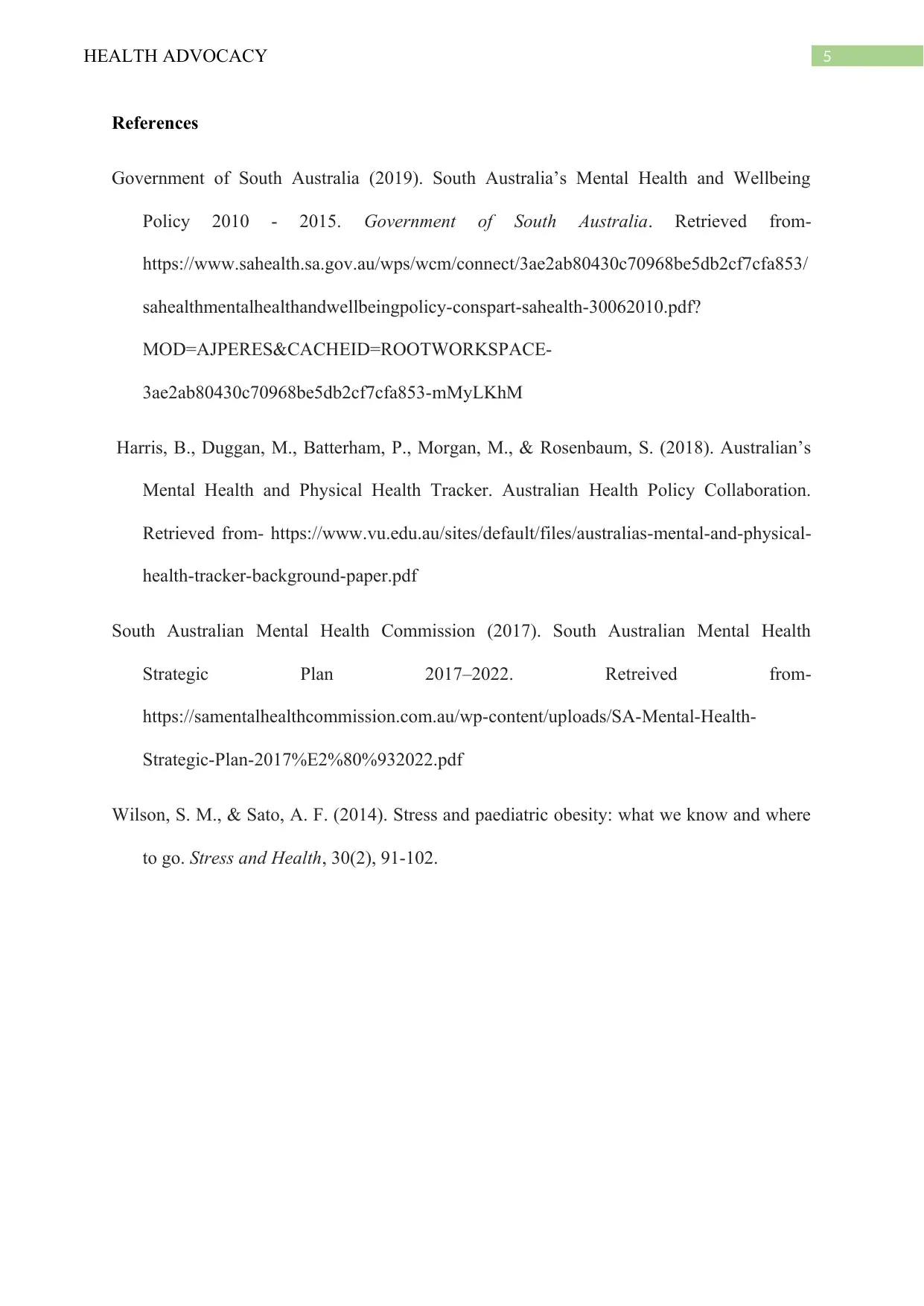
5HEALTH ADVOCACY
References
Government of South Australia (2019). South Australia’s Mental Health and Wellbeing
Policy 2010 - 2015. Government of South Australia. Retrieved from-
https://www.sahealth.sa.gov.au/wps/wcm/connect/3ae2ab80430c70968be5db2cf7cfa853/
sahealthmentalhealthandwellbeingpolicy-conspart-sahealth-30062010.pdf?
MOD=AJPERES&CACHEID=ROOTWORKSPACE-
3ae2ab80430c70968be5db2cf7cfa853-mMyLKhM
Harris, B., Duggan, M., Batterham, P., Morgan, M., & Rosenbaum, S. (2018). Australian’s
Mental Health and Physical Health Tracker. Australian Health Policy Collaboration.
Retrieved from- https://www.vu.edu.au/sites/default/files/australias-mental-and-physical-
health-tracker-background-paper.pdf
South Australian Mental Health Commission (2017). South Australian Mental Health
Strategic Plan 2017–2022. Retreived from-
https://samentalhealthcommission.com.au/wp-content/uploads/SA-Mental-Health-
Strategic-Plan-2017%E2%80%932022.pdf
Wilson, S. M., & Sato, A. F. (2014). Stress and paediatric obesity: what we know and where
to go. Stress and Health, 30(2), 91-102.
References
Government of South Australia (2019). South Australia’s Mental Health and Wellbeing
Policy 2010 - 2015. Government of South Australia. Retrieved from-
https://www.sahealth.sa.gov.au/wps/wcm/connect/3ae2ab80430c70968be5db2cf7cfa853/
sahealthmentalhealthandwellbeingpolicy-conspart-sahealth-30062010.pdf?
MOD=AJPERES&CACHEID=ROOTWORKSPACE-
3ae2ab80430c70968be5db2cf7cfa853-mMyLKhM
Harris, B., Duggan, M., Batterham, P., Morgan, M., & Rosenbaum, S. (2018). Australian’s
Mental Health and Physical Health Tracker. Australian Health Policy Collaboration.
Retrieved from- https://www.vu.edu.au/sites/default/files/australias-mental-and-physical-
health-tracker-background-paper.pdf
South Australian Mental Health Commission (2017). South Australian Mental Health
Strategic Plan 2017–2022. Retreived from-
https://samentalhealthcommission.com.au/wp-content/uploads/SA-Mental-Health-
Strategic-Plan-2017%E2%80%932022.pdf
Wilson, S. M., & Sato, A. F. (2014). Stress and paediatric obesity: what we know and where
to go. Stress and Health, 30(2), 91-102.
⊘ This is a preview!⊘
Do you want full access?
Subscribe today to unlock all pages.

Trusted by 1+ million students worldwide
1 out of 6
Related Documents
Your All-in-One AI-Powered Toolkit for Academic Success.
+13062052269
info@desklib.com
Available 24*7 on WhatsApp / Email
![[object Object]](/_next/static/media/star-bottom.7253800d.svg)
Unlock your academic potential
Copyright © 2020–2026 A2Z Services. All Rights Reserved. Developed and managed by ZUCOL.





